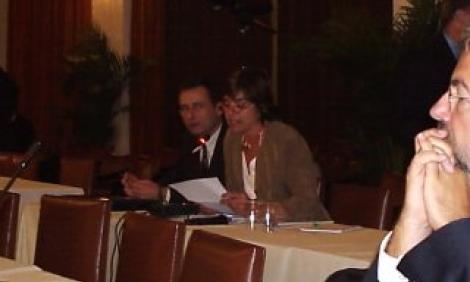In depth
Gender and ICT policies: it's time to reorder our forces and understand what is happening
Magaly Pazello is the only Brazilian feminist who’s been active in the WSIS process since its inception. A member of the WSIS Gender Caucus, she is also member of the DAWN network - Development Alternatives with Women for a New Era. In the Latin America and the Caribbean Regional Preparatory Conference, held in June 2005 in Rio de Janeiro, Graciela Selaimen interviewed Magaly Pazello, speaking…

In depth
WSIS Rio regional meeting: very few doors open for the gender perspective
No participation of civil society as observers in the governmental delegations' meetings; no gender working group in the final regional action plan ELac 2007; almost no women, black people or indigenous people as panelists. Although the Rio WSIS Regional Meeting opened two slots for civil society statements in the plenary and produced documents which were fairly positively received by NGOs and…

In depth
Gender and ICT policies: how do we start this discussion?
"Although the women’s movement has adopted ICTs in their work as an important tool, it has given little attention to ICT policies". This and many other issues were discussed in the workshop “Networking for Change and Empowerment: Building a Feminist Agenda for ICT Policies” that APC Women’s Networking Support Programme and APC LAC ICT Policies Monitor organised during the World Social Forum, in…
Publication
Statement of the Gender DC for the Taking Stock and Moving Forward Session 2008
The statement of the IGF Dynamic Coalition on Gender presented at the third Internet Governance Forum in Hyderabad, India,on the 6 of December 2008.
Publication
Report on Engendering the ICT Policy Process in Uganda
The findings of this research indicates there were attempts to identify and eliminate gender disparities in access and use of ICT within the Uganda national ICT policy development process. However clear-cut gender incorporation strategy was missing, and the ICT policy process was largely dominated by men. This The report includes a set of recommendations how to further enhance gender equality…
Publication
LISTEN: Communication Rights for Women - Why the Purse feels empty? Effective Financing Mechanisms to Progress Gender Equality [part 2]
Radhika Lal, a policy advisor on ICT for poverty reduction and the Millenium Development Goals (MDG) in the UNDP, presents her views on effective financing mechanisms to progress gender equality in the information society. This was presented at the panel “Communication Rights for Women - Why the Purse feels empty?: Financing for women's equitable access to Information and Communication…
Publication
THE WORLD WIDE WEB OF DESIRE: Content Regulation on the Internet
This paper attempts to look at some of the paradoxes that emerge in content regulation discussions. It brings in feminist or gendered perspective, which provides different and varied understandings of “harmful content”, as well as opens the question of adequate representation of all voices in the content regulations debates.
Publication
Cinderella or Cyberella? Empowering Women in the Knowledge Society
Edited by Sophia Huyer and Nancy Hafkin, this book collects essays by Sonia N. Jorge, Shafika Isaacs, Shoba Arun, Richard Heeks, Sharon Morgan, Maria Garrido, Raul Roman, and Vikas Nath on the current landscape of gender and ICT. According to Claudia Morell, the book "provides an excellent overview of the critical issues addressing the global participation of girls and women in today's…
Publication
Mainstreaming Gender Issues in ICT Policy Development - Draft
This is a draft copy of a research conducted by FMA to look into gender mainstreaming efforts in ICT policy development. in the Philippines. In particular, Section 4 of the research is culled to demonstrate and examine ICT policy in the current Philippines context, with attention to the inclusion of gender within its processes.
Publication
E-Governance Initiatives in an Indian State: Some Observations from a Gender Perspective
The paper explores to what extent the women in the Indian State of Chhattisgarh have been able to access and to use e-governance initiatives, as compared their male counterparts, and how far these e-governance initiatives been able to address and include the needs of women.




